

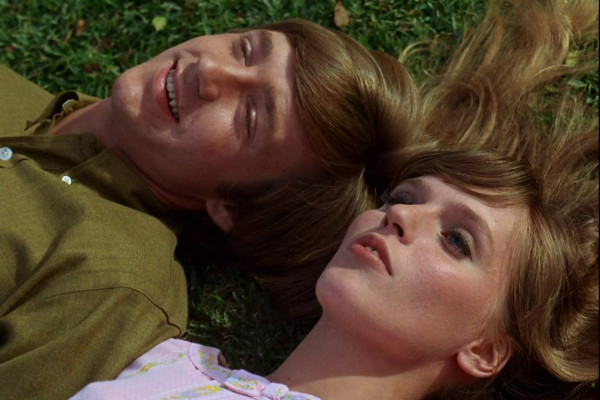
Also known as Peter and the Debutante, this is a rare "romance" episode in that it's Peter, not Davy, who takes the lead. However, this is not the only thing that's new... the object of Peter's desire already has a boyfriend. Now, granted, George Furth's "Ronnie Farnsworth" is snobbish, pompous and rude, but he's not an out-and-out evil villain that the girl needs saving from, as with many other episodes. Suddenly the nominal "heroes" of the show turn perverse, their only intention not to save a circus or help a small boy keep his horse, but to steal a man's girlfriend away from him.
Away from such morally questionable plot mechanics, there are some good lines in this script from Gerald Gardner, Dee Caruso and Treva Silverman, from remarks about the Monkees needing to get an interior decorator in if they wanted to condemn their home, to Mike, being told that he's vain, noting "I'm all I have." While the Monkees going on a disguise-based offensive usually bamboozles their opponents, Farnsworth proves to be their match, seeing through them and devising his own schemes.
Peter Tork is, to date, the only member of the group yet to write an account of his time in the Monkees, and in interviews often seems spiky and bitter, a far cry from the care-free character he plays in the series. As a result it can be a little hard to watch Peter-based episodes given that the illusion has now been retroactively corroded.
Yet Lisa James does well as the object of his affection, and Furth may take the prize as the best guest star the series had, neatly balancing the line between a "large" performance and OTT in a way that, in other many other hands, fell flat. Despite the ethical issues at its core, this is a good episode, so much so that it would be churlish to question how Peter can dance with his love at the debutante's ball, when he's also the one playing the music...
Songs: "I'm a Believer", "You Just May Be the One" (original version)
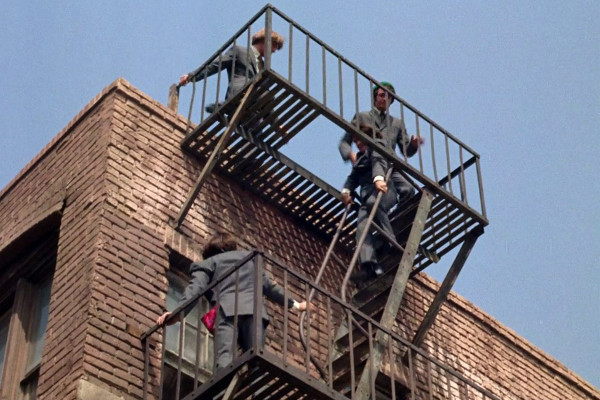
Despite accusations that they were just manufactured knock offs of The Beatles (most famously the slur "The Pre-Fab Four"), The Beatles themselves were very welcoming and complimentary of The Monkees. One of the most famous (possibly untrue) quotes is John Lennon comparing them to the Marx Brothers, and the Marx Brothers influence is writ large here, with a frenetic adventure in a New York hotel.
Travelling to a hotel where an aspiring playwright, McKinley Baker, wants to use them for a Broadway show, they quickly find that he can't pay his hotel bill and has to leave them in the room while he travels to meet his financial backer. A bleaker, more cynical show would have had Baker setting the Monkees up, leaving them with an extortionate hotel bill, but this isn't that kind of programme. And, even though Baker comes back empty-handed, the Monkees are still able to put on some disguises and eventually get the cash from a millionaire's club which is conveniently situated across the road.
There's some fairly racy jokes here, with multiplying rabbits, and a honeymooning couple who are interrupted, but look out for a massive goof - the Monkees try to order room service by changing the number on their door from 304 to 305... except that "305" had already appeared on their door far earlier, making it clear that it was filmed out-of-sequence. Lastly, one slight detraction from the series is the tendency to reuse footage in the romp sequences... this is made a virtue here, where Mike describes what a stage show of their life would look like, and a montage of many previous episodes plays out over Look Out, Here Comes Tomorrow, a kind of "greatest moments" package, and a fun look back at some earlier adventures.
For a fairly tightly plotted and written episode, it's surprisingly short, with over six-and-a-half minutes of runtime left when the story wraps up. This is filled with a lengthy conversation with the group, where Micky reveals himself to be more thoughtful than the character he plays, and Mike shows his quick wit. The whole episode is then bookended by a performance of "Words", where the group change instruments, and Davy, miming the drums, is on the verge of wetting himself.
Songs: "The Girl I Knew Somewhere," "Look Out (Here Comes Tomorrow)", "Words" (original version)
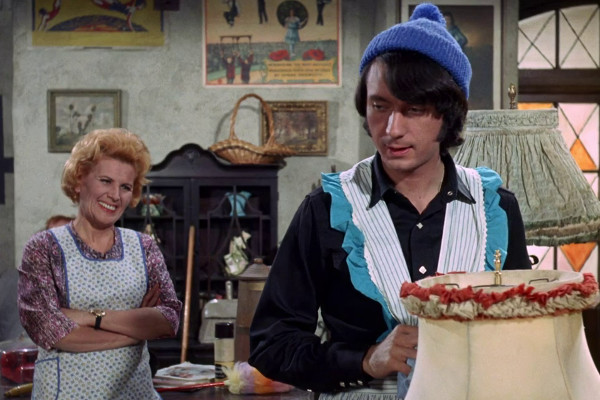
The first episode to be filmed entirely in the Monkees' "house", something only attempted again in season two's A Coffin Too Frequent. However, it's not just the setting that makes this episode offbeat: it's one that tries for genuine sentiment, too. When the Monkees can't afford to pay their rent, the landlord tells them they're evicted and moves in a new tenant. However, said new tenant, Milly (Rose Marie) has maternal feelings for the group and takes them on as lodgers.
While the status quo is naturally restored by the end of the episode (the Monkees get Milly married off, and use the money they earned playing at her wedding to pay their outstanding rent), throughout Milly develops a real bond with the group and they share their own stories of loneliness and insecurity. Not all of it matches up to anything approaching reality - Mike claims to have come from a large, poor family and desires success, despite the fact that he was an only child with a rich mother and the real group had had three hit singles and two No.1 albums when the episode aired - but it's easy to go along with the episode and join in the fun.
The song material is particularly strong, with Gerry Goffin and Carole King's dreamy "Sometime in the Morning", and Davy giving an impassioned mime to the first of three appearances of the Neil Diamond track "Look Out, Here Comes Tomorrow". The episode also marks the final appearance of Henry Corden as the landlord, though he appears in the season two episode The Wild Monkees as a different character.
Songs: "Sometime in the Morning," "Look Out (Here Comes Tomorrow)"
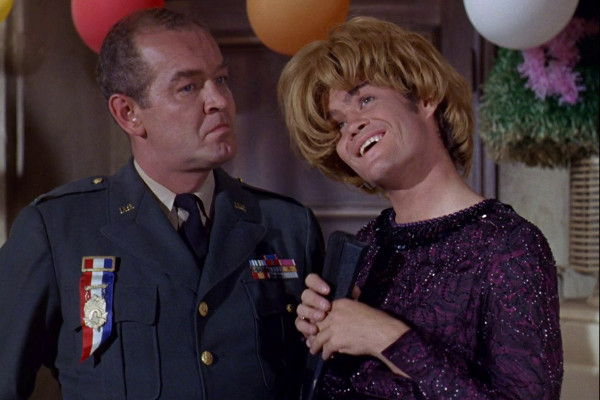
Davy wants to date a retired army general's daughter, but a variety of misfortunes means that Micky has to dress up as a female chaperone in order to allow a party to take place. Despite the somewhat dated devices for humour, this one is tightly plotted for a Monkees episode, has some strong guest performances and clear signs the group are genuinely enjoying themselves. In particular, look out for them all taking turns to try and distract each other during the various mimed song sequences.
Songs: "This Just Doesn't Seem to Be My Day," "Take a Giant Step" (alternate vocal track), "You Just May Be the One" (original version)
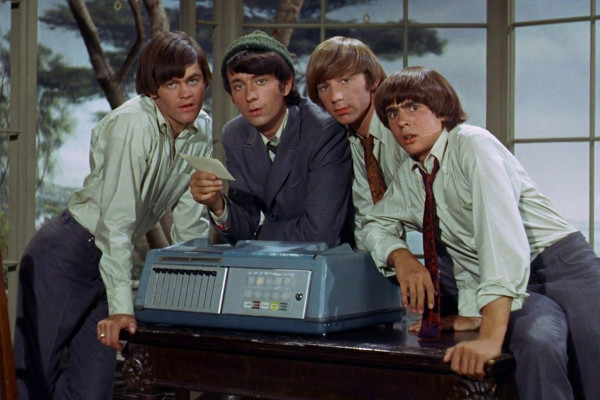
60s cult television almost seemed awash with people destroying computers via logic... shows like Star Trek and Doctor Who thrived on it, and No.6 was doing the same thing in The Prisoner just ten months after this particular episode aired. Where The Monkees scores over these other works is that this somewhat quaint and reactionary plot device is here played out in a brightly-lit family show with canned laughter and comedic intent, and so consequently can't look as staid.
The innocence surrounding the programme can be gleaned from the first song sequence, which sees the band act out a desire to play with small children on the beach. It's a stark reminder of how society and perception have changed that such an act can no longer be presented on television to the same effect.
Continuing the theme of children is the band disguising themselves as schoolchildren, which is amusing with the 5'3 Davy Jones, but presented to decreasing returns with the others. All this said, it's one of the strongest episodes of the whole series, well deserving of its top five placing here.
Songs: "Saturday's Child" (alternate vocal track), "Last Train to Clarksville"
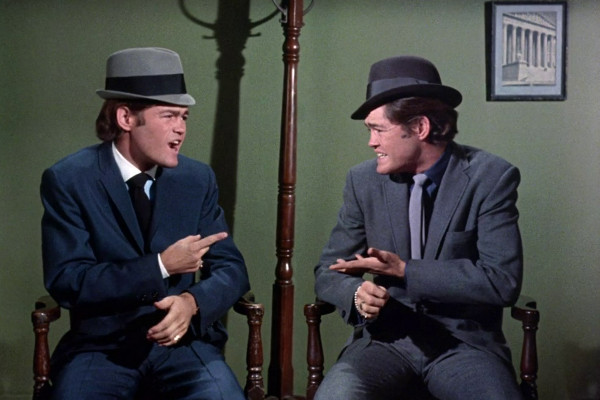
Although this story about a gangster double seems a very traditional episode of The Monkees, it's highly unorthodox as it mainly, as the title suggests, just features Micky. With Davy Jones on holiday in England, Mike and Peter are pushed to the background, and there's protracted sequences where Micky is the only member of the group onscreen, interacting with the guest cast, with Peter not even showing up until over the halfway point. The episodes of the series are short, just around 25 minutes each, so an entire ten minutes without any Monkee other than Micky on screen is both unusual and quite daring.
For once a song montage isn't a romp, but a slowed-down sequence of violence. While not quite the work of Tarantino, it is odd seeing "The Kind of Girl I Could Love" play out to series of punches and broken bottles being waved around. While gangsters in The Monkees are always one-dimensional caricatures there purely for comic effect, their genre does bring with them an elevated level of violence which is a slightly odd fit with the usual set-up.
Although the series is rarely hilarious to anyone above the age of 12, there are some nice silly lines in this one, such as Micky claiming he fixed spotlights by "breaking out in the daytime", and Dolenz does tone down his usual "mug and hope for the best" antics somewhat. The effects used to create "doubles" aren't as strong as those in The Prince and the Paupers, but this is a far stronger episode than the double episode for Davy Jones. Davy gets to appear in two tag-ons, with a song sequence and a brief interview, but the episode is Micky's all the way.
Songs: "The Kind of Girl I Could Love," "Mary, Mary"
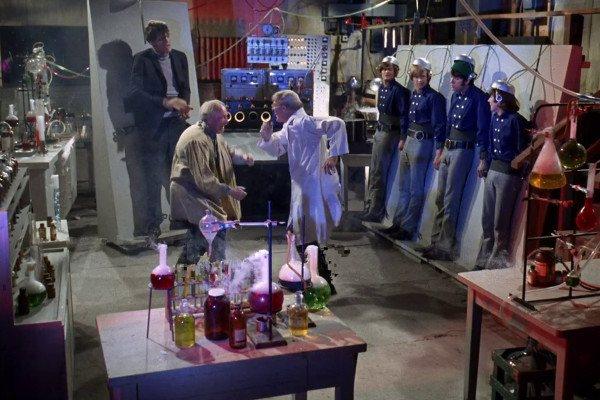
The first season of The Monkees is much more uniform in comparison to the excesses and experimentation of season two. Of the 32 episodes present (or 31, as Monkees on Tour is not a "plot" episode) the three most prolific writers, Gerald Gardner, Dee Caruso and Dave Evans, have some form of involvement in 21 of them. Fast forward to season two and the writing input of one or more of them is limited to just five episodes. I Was a Teenage Monster was written by all three of them, from an idea by Dave Evans. (The same set-up of idea and writers also gave us Too Many Girls and Alias Micky Dolenz).
Featuring 7'1 Richard Kiel as a Frankenstein's monster parody, while Kiel dancing and singing in a Beatles wig can be amusing, the look of the creature can also be genuinely quite scary for the very young. With an evil scientist trying to steal the Monkees' musical ability and place it in the monster, it's an instalment that has an energy and pace that many other episodes lack, and is well made and put together. There's even a Citizen Kane gag thrown in for good measure, as well as the Marmite song "Your Auntie Grizelda", which has an off-beat, perverse appeal.
Songs: "Tomorrow's Gonna Be Another Day," "Your Auntie Grizelda"
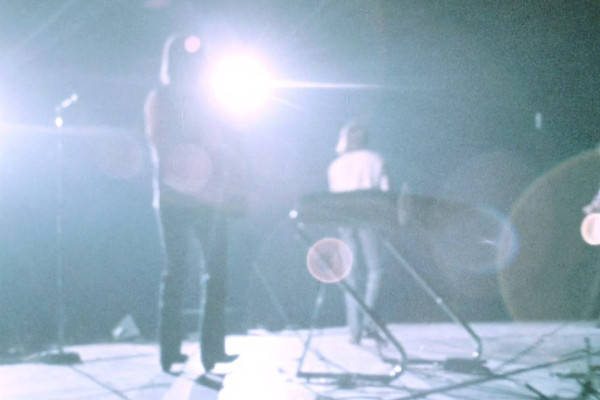
Producer Bob Rafelson recorded this episode on his own time without the help of the studio, as they did not take to his idea of a non-character "behind the scenes" look at a tour. It's a terrific mini movie, shot on 16mm film, and has a real "period documentary" feel to it. While both of the Monkees articles on The Anorak Zone have sometimes regarded the TV series as "there to sell records", Nesmith was adamant in his autobiography that this wasn't the initial intent, and more just happened as a lucky accident.
There are some amusing bits, such as the girl who thinks she's gone to a Rolling Stones concert, along with some candid moments where they all describe their fatigue with the whole concept. There's a writing credit for Rafelson, so it's not always clear how much of it is pre-planned... certainly Davy is self-aware in his "off duty" moments, and a part where they "take over a radio station" is hastily contrived. But, while not strictly a "Monkees" episode in the purest sense, this should be a fascinating watch for anyone interested in the group and their music, and a fine way to close the first season.
Songs: "The Girl I Knew Somewhere", "I'm a Believer"
Concert Songs: "Last Train to Clarksville", "Sweet Young Thing", "Mary, Mary", "Cripple Creek", "You Can't Jude a Book By Its Cover", "I Wanna Be Free", "I've Got A Woman", "(I'm Not Your) Steppin' Stone"